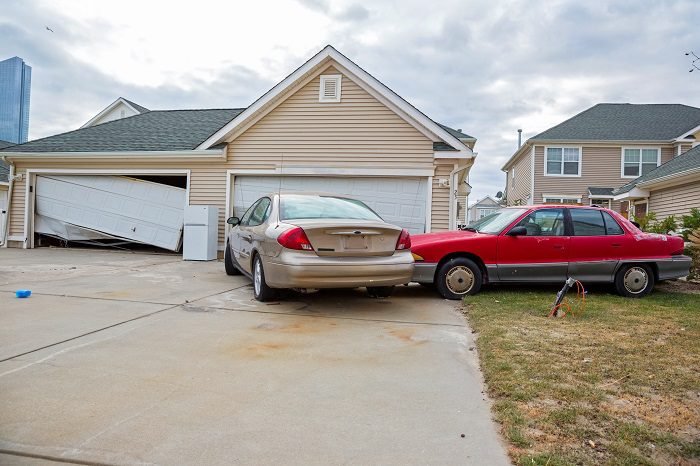
Does Home Insurance Cover Garage Door
Does Home Insurance Cover Garage Door? Will homeowners insurance cover the repair or replacement of my garage door? Garage doors can withstand a lot. After all, protecting your garage and home requires a lot of durability and care! While a quality garage door will last for 10-15 years, accidents can happen. Your children may bump into the garage door while playing hockey, or your garage may be damaged in severe weather; Regardless of the reason, it probably needs to be repaired. For those with home insurance, there may be an opportunity to receive money to help pay for a repair or replacement. Your garage is part of your home, right? While every policy is different, there are some situations where homeowners insurance can cover garage door repairs.
Does Home Insurance Cover Garage Door?
What situations does my homeowner’s insurance cover for the repair/replacement of my garage door?
Vehicle Damage
Have you or a family member accidentally bumped into your garage door? Winter weather doesn’t always make parking easy, especially if there’s icing in the driveway. Fortunately, there is good news! Most homeowners insurance policies cover vehicle damage but check your policy to be sure. What if a guest accidentally hits your garage with his car while visiting your home? If someone damages your garage with their vehicle and they are not part of the family living in your home, your auto liability insurance should cover it for you!
Natural Disasters
Severe weather can be tricky when it comes to homeowners coverage. If your garage door has been damaged by hail or wind-blown debris, your insurance will likely cover some of the repair costs. It is important to read your policy carefully as some things that you think are covered are not covered! For example, if your garage door was damaged by a natural disaster such as an earthquake or flood, you may have to pay for the repair yourself. It is best to check your policy to see what it covers.
Vandalism or theft
Your homeowner’s insurance likely covers malicious activity; this includes things like graffiti and other forms of vandalism, especially terrifying situations like burglaries. If someone enters your home through your garage, your insurance will likely cover the repair costs (you’ll want to double-check, of course). Homeowners insurance is designed to provide a safety net for you and your home, including your garage!
What if my garage door shows general wear and tear?
Unfortunately, there is no insurance coverage for the general wear and tear that a garage door can experience. While your garage door may be noisy or dented, your homeowner’s insurance probably won’t cover any of the repairs if it’s general wear and tear. Following regular maintenance best practices will extend the life of your garage door and prevent repairs (barring an accident).
What is covered?
Before you begin to understand whether your garage doors are covered by home insurance, take a closer look at what’s covered. Always remember to review your home insurance policy as you prepare for different times of the year. Let’s take a look at what most home insurance policies cover:
- Damage to your car: If you accidentally reverse or hit your garage door and cause damage, you can file a claim to cover the damage. In addition, damage to your vehicle must be repaired under your auto insurance policy.
- Theft: Damage to your garage door as a result of burglary is covered by your home contents insurance. Make sure you know how much stolen property coverage you have on your policy.
- Vandalism: Homeowners insurance covers repairs for property damage caused by malicious activity. Spray paint or damage to a baseball bat are the two typical culprits. Just fill out a police report and send a copy to your insurance company for a check to cover the damage.
- Fire Damage: In this case, the homeowner’s policy covers the replacement of a garage door, as well as the rest of your home’s value. House fires are usually accidental and rarely known.
Any storm is classified as a natural disaster; Not all natural disasters are covered by a homeowner’s insurance policy. Floods, earthquakes, and wildfires can cost you additional coverage. In most cases, high winds, hail damage, and lightning are covered.
What is not covered?
If you know your home contents insurance, you will also know what is not covered. Keeping up with basic maintenance on items not covered by your homeowner’s insurance policy can help you avoid overspending on repairs. Let’s take a look at what’s considered not covered:
Minor Damage: This is where deductibles come into play. You are only responsible for the deductible if the amount to repair the damage exceeds your deductible. For example, if the garage damage is $2,000 and your deductible is $500, you will pay $500. Insurance will then pay the remaining $1,500.
Wear and tear: If your garage door has been around for a long time and eventually wears out, insurance will not cover replacement. Your best bet is to call a garage door service company. Have minor repairs been made to extend the life of the door?
The damage is intentional: the insurance company usually needs photo and video evidence to prove the damage. If it appears that the damage was done intentionally, the insurance company will consider this fraud. You can be fined and spend time in jail.
Can Updating Your Garage Door Lower Your Homeowners’ Insurance Costs?
You may be wondering if buying a new garage door will help improve a homeowner’s insurance cost. Updating your garage door is a great investment, not only for the value of your home but also for reducing homeowners’ liability. By installing a storm-proof or impact-resistant garage door, you can reduce your homeowner’s insurance costs (sometimes by 10%).
Here are the recommended garage door materials to help reduce accident or weather-related insurance claims:
- The most durable type of garage door you can install is a steel garage door. If you live in an area with a hurricane or high winds, upgrading to a steel door is best to reduce damage to the garage door from weather conditions.
- A heavy-duty insulated garage door can reduce repairs and keep your home warmer or cooler in areas of extreme heat or cold.
- Vinyl and glass garage doors can help prevent rust, fading, dents, or cracks in areas subject to heavy flooding or rainfall.
- Aluminum garage doors are suitable for coastal areas because they resist oxidation or rust.
- A fiberglass garage door is a good option if you want the look of a wooden garage door without maintenance. It is also termite and dent resistant.
How to determine if your garage door is covered by your insurance?
Before making a claim, the first thing to check is your insurance policy. With most home insurance policies, garage doors are an integral part of the coverage.
Brent Thurman, the owner of Keystone Insurance, which offers home insurance in Utah, has this to say:
Since garage doors and openers are attached to the structure, they are considered part of the “home” from a homeowners insurance standpoint, including physical breakage losses. This is different from a mechanical breakdown or wear and tear… Think of it more like one of your kids crashing through your garage door. It also falls under the usual suspects…wind, fire, hail, vandalism, etc.
You just need to see what exactly the coverage is. Your insurance usually covers any damage you or a family member has caused to the garage door. If a third party is responsible, such as when your neighbor accidentally hits your garage, that person’s auto insurance will cover the cost of repair or replacement.
In the event of theft and damage, fire, or vandalism, homeowners’ insurance must be able to cover this.
Keep in mind, however, that intentional damage to your garage door is often not covered, including certain natural disasters. If you have a garage door that is separate from your home, it is also worth checking whether it is covered or not.
How to File a claim?
Depending on the type of insurance you have, filing a claim can be simple or quite complicated.
You must submit documentation about your claim. The required documentation may vary depending on the scenario.
If your claim is related to a crime, for example, vandalism or arson, you should normally report it to the police. This could also be the case if your claim concerns a vehicle that accidentally bumped into your garage door. In other cases, your insurance company may require receipts for repairs made or send a loss adjuster to determine the cost of the repair.
Some considerations:
If your door has been damaged by a break-in, it may be worth considering how to strengthen the security of your garage door. Garage Door Service has a wide range of garage door openers, keyless entry, and remote controls to ensure your garage door is well protected.
If the damage is due to fire, it may be worth looking into fire-retardant materials. If your old garage door is prone to dents, you can also look at other alternatives.
What If The Garage Is Separate From The House?
If your garage is separate from the house, can it be covered by your homeowner’s policy? In some cases, a detached garage is covered by your home insurance policy under an “other constructions” policy. This policy protects fences, pools, sheds, and even garages that are not technically part of the home. However, it is usually covered for a lower percentage compared to the rest of your home.
Check your policy carefully to find out how much coverage you have if your garage is separate from the rest of your home.
Does Home Insurance Cover Garage Door?
In most cases, garage door repair is covered by standard homeowners insurance. But what about home insurance and garage door replacement?
Sometimes the damage is extensive and a new garage door is needed. If the repair cost exceeds the cost of a new garage door, replacement is covered by insurance.








